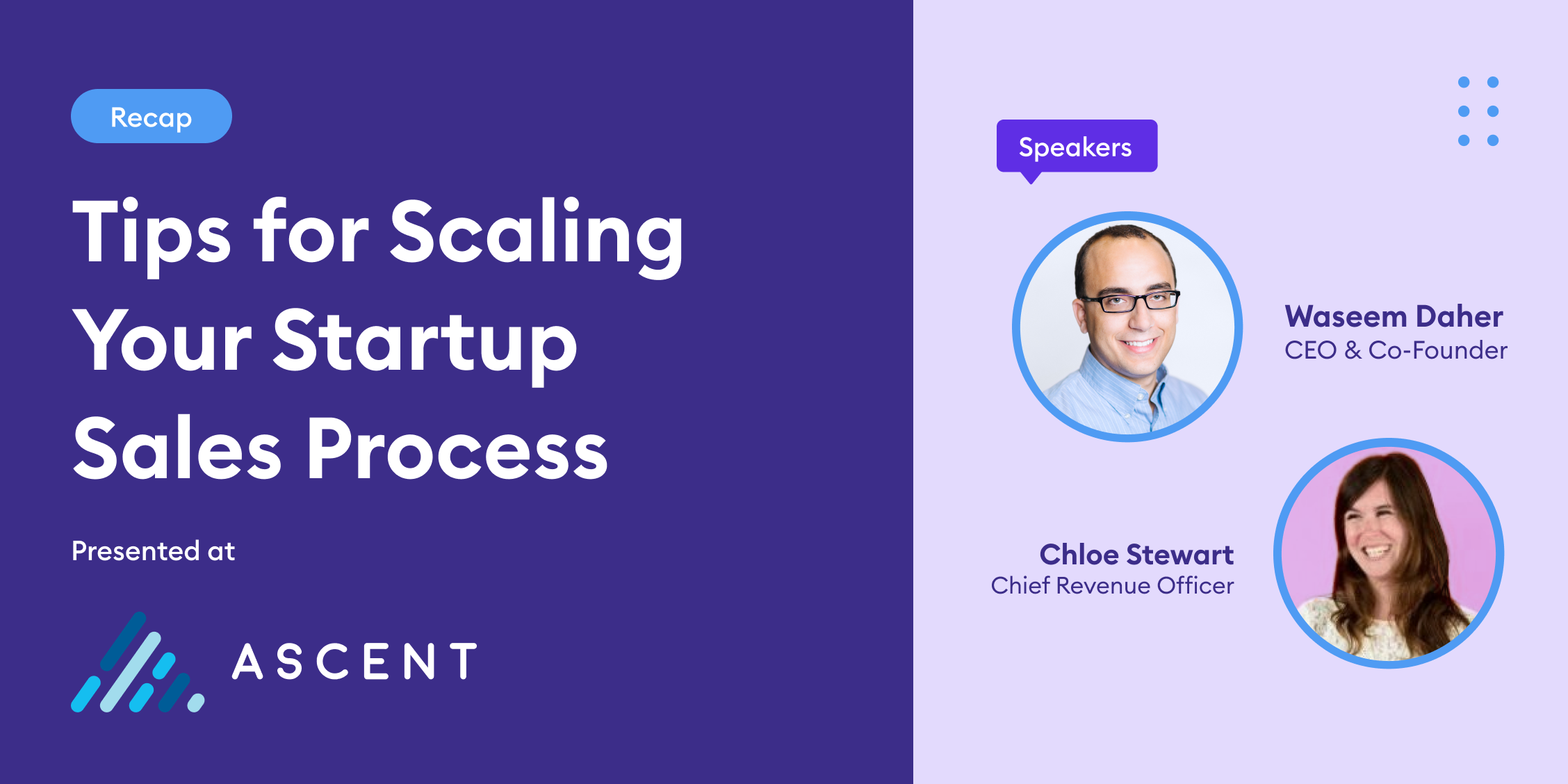Tips for Scaling Your Startup Sales Process
A confirmation email has been sent to your email.

Sales teams play a vital role in the overall success of many businesses.
Though game-changing products or services can help you stand out in a crowded field, sales teams ensure that people are actually buying and using it.
The problem is that building out your sales team can be a pretty daunting task, especially if you’re a technical founder or a first-time founder who doesn’t have much experience in sales.
In November, Pilot Co-Founder and CEO, Waseem Daher, and Chief Revenue Officer, Chloe Stewart, recently offered advice to startup founders about growing sales from the ground up at the 2021 Ascent Conference.
Here’s a recap of their Ascent Conference session on what you should keep in mind if you, as a founder, are tasked with building out the sales process or team for your organization.
Founders should take on a sales role before hiring sales professionals
Pilot Co-Founder and CEO Waseem Daher admits that selling the first 100 or so accounts for all three of his startups — Zulip, Ksplice, and Pilot — wasn’t exactly easy or glamorous, for that matter.
Still, these experiences taught him a valuable lesson.
“When you do the sales yourself, it really lets you be a periscope into the world,” Daher said. “You learn about what your customers like, what they don't like, what messaging resonates with them, what features they actually require versus the things they say they require, and it's actually really, really critical in helping you make sure you're building the right thing.”
In fact, he said, bringing in sales professionals to secure your company’s earliest deals may actually be a huge mistake, especially if you’re trying to nail down product-market fit and determine what must be made so customers will buy it.
“Disintermediating yourself from the people who are your actual customers can be a huge mistake,” Daher said. “If you filter all that feedback through anyone else you're not going to get the right data and you're going to be confused, like are we not selling because the product is bad? Are we not selling because the messaging is wrong? Are we not selling because the salesperson I hired isn't good?”
At the very least, founders should close their company’s first few deals on their own, Daher said.
“I think you want to be involved,” he explained. “You have to learn what's working and what's not. You have to really viscerally understand what your customer's problems are and how you can solve them.”
When you eventually hire your first sales lead, it’s important for that person to bring the right feedback and data to founders and other teams within the company for feedback.
“I really think that I'm here to help articulate the vision of the founder, and it's really difficult to do that if the founders haven't actually been in the trenches to some extent,” Pilot Chief Revenue Officer Chloe Stewart said. “You, as the sort of owner of the business, know the customer, know the product in a different way than other folks in the business do. Having that relay of information and having that be a really cohesive conversation is so important to ensure that your new sales leader is coming in to hit the ground running and aren’t making the same mistakes.”
Tap into professional networks to find your first customers
If your company is small and just getting off the ground, getting prospects to trust you and your company won’t be an easy task.
“In general, people who don't know you will not trust you,” Daher said. “It's a brand new thing and you're trying to figure out how to kind of get it out there.”
Founders tend to shy away from leaning on their professional networks, but these contacts may actually be great first customers since “they're actually more likely to give you really unvarnished feedback if they have some connection to you,” Daher said.
“If your thing is bad, they'll tell you that it's bad because they know you,” he explained.
The key is to identify those connections who may be a great fit for your company’s products or services and reach out. However, your initial conversations with professional connections shouldn’t actually revolve around selling your company’s products or services. Instead, ask if what your company is doing and offering can solve a real problem that they have.
“If it does solve a real problem they truly have, well, then they should be willing to buy it from you,” Daher said. “If it doesn't solve a real problem they have, that's actually really, really valuable feedback for you.”
Once you’ve secured your first customers, it’s helpful to ask if they know other people who are like them and would also be a good fit for your company’s products or services. You should also look for common attributes that your first few customers share, such as employee size, funding stage, industry type, or geographic location, and use those insights to search for more prospects.
“You’ll actually find that frequently your current customers know other people who are like them and would also be a good fit,” Daher said. “In some cases, they may be competitors of those customers, but generally speaking, they’re very interested and open to making those intros because you’re a small, scrappy startup and they want to help you out.”
Build out your sales process before building out your sales team
Before you even start to look for new sales hires, it’s important to focus on creating a repeatable sales process that can be reliably executed. Once that happens, you should start searching for new sales hires when things start slipping through the cracks and you’re too strapped on time to do it all on your own.
But the people you first hire may not necessarily be your long-term sales leaders.
“Managing a large, high-performing sales team is very different than being the first sales rep at a company who’s selling a product for the first time,” Daher said. “I would rather focus on someone who will work with you to scale, help you write the playbook, and be great on the phone. I wouldn't overfit on significant management experience or whatever in the first sales hire.”
After about five to 10 sales representatives join your sales team, you’ll probably want to start looking for people who can maintain your customer relationship management platform, as well as helping you create forecasts, update quotas, and analyze your sales pipeline, among other things.
Want to listen to the rest of their conversation? Access their recorded talk here, and sign up for notifications whenever Pilot holds a webinar with a wide range of thought leaders in venture capital, finance, and more.


